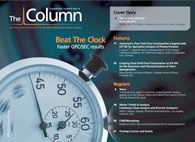Nobel Laureate at Pittcon
Nobel Laureate, Sir Harold (Harry) Kroto, will present the Wallace H. Coulter Plenary Lecture at Pittcon 2013.
Nobel Laureate, Sir Harold (Harry) Kroto, will present the Wallace H. Coulter Plenary Lecture at Pittcon 2013. His talk will be entitled “Exameter Objects to Nanometer Ones and Back Again”. The plenary lecture will be part of the opening session for the event, which will be held in the Pennsylvania Convention Centre, Philadelphia, Pennsylvania, USA, 17–21 March 2013.
Sir Harold is currently Francis Eppes professor of chemistry at Florida State University, Tallahassee, Florida, USA, investigating nanoscience and cluster chemistry. He was knighted for his contributions to chemistry in 1996 and later in the same year his laboratory experiments involving the simulation of chemical reactions in the atmospheres of red giant stars uncovered the existence of C60 — also know as Buckminsterfullerene — the third well-characterized allotrope of carbon.
Kroto, together with Robert Curl and Richard Smalley, won the 1996 Nobel Prize in Chemistry for this ground-breaking work. He has won numerous other awards including the Copley Medal and Faraday Lectureship of the Royal Society.
For more information about the event visit www.pittcon.org
This story originally appeared in The Column. Click here to view that issue.

Identifying PFAS in Alligator Plasma with LC–IMS-HRMS
April 15th 2025A combination of liquid chromatography ion mobility spectrometry, and high-resolution mass spectrometry (LC–IMS-HRMS) for non-targeted analysis (NTA) was used to detect and identify per- and polyfluoroalkyl substances (PFAS) in alligator plasma.
Extracting Estrogenic Hormones Using Rotating Disk and Modified Clays
April 14th 2025University of Caldas and University of Chile researchers extracted estrogenic hormones from wastewater samples using rotating disk sorption extraction. After extraction, the concentrated analytes were measured using liquid chromatography coupled with photodiode array detection (HPLC-PDA).
Profiling Terpenoids in Cannabis with GC×GC-MS
April 14th 2025A joint study conducted by the University of Ferrara (Italy) and the Council for Agricultural Research and Economics (Rome, Italy) focused on the analysis of terpenes and terpenoids—key bioactive compounds responsible for the distinctive flavor and potential therapeutic effects of cannabis. For this study, the research team used comprehensive two-dimensional gas chromatography coupled with mass spectrometry (GC×GC-MS) coupled with dynamic headspace extraction (DHS) to profile these compounds in cannabis inflorescences. LCGC International spoke to Flavio A. Franchina of the University of Ferrara, corresponding author of the paper which resulted from this study, about their research.










